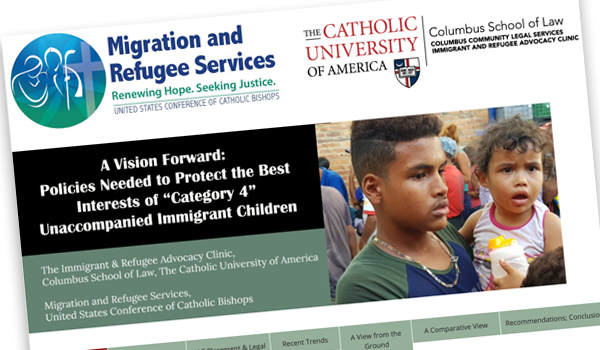 Stacy Brustin, Professor of Law and Director of the Immigrant and Refugee and Advocacy Clinic (IRAC) at Catholic Law, recently authored a comprehensive report regarding the care of unaccompanied immigrant minors entitled, “A Vision Forward: Policies Needed to Protect the Best Interests of ‘Category 4’ Unaccompanied Immigrant Children.” Brustin—with significant drafting and research support of IRAC students, Class of 2021 graduates Kelechi Eke, Brenda Keels, and Erica Hornbuckle—partnered with the United States Conference of Catholic Bishops (USCCB) Migration and Refugee Services to develop this critical report.
Stacy Brustin, Professor of Law and Director of the Immigrant and Refugee and Advocacy Clinic (IRAC) at Catholic Law, recently authored a comprehensive report regarding the care of unaccompanied immigrant minors entitled, “A Vision Forward: Policies Needed to Protect the Best Interests of ‘Category 4’ Unaccompanied Immigrant Children.” Brustin—with significant drafting and research support of IRAC students, Class of 2021 graduates Kelechi Eke, Brenda Keels, and Erica Hornbuckle—partnered with the United States Conference of Catholic Bishops (USCCB) Migration and Refugee Services to develop this critical report.
The nearly year-long process of creating the report stemmed from Brustin’s interest in engaging the clinic in immigration policy work. She decided that it would be best to partner with organizations already operating in that space. After reaching out to several organizations, Brustin found an opportunity with USCCB Migration and Refugee Services—natural allies when it came to the development of the project. USCCB Migration and Refugee Services suggested a few different policy areas that would benefit from the clinic’s assistance. Brustin was particularly interested in the care of unaccompanied children categorized as belonging to “Category 4,” a classification for children whom the government determines do not have viable sponsors in the U.S. The issue combined aspects of human rights law, immigration law, and family law which was Brustin’s area of specialization prior to practicing immigration law.
Eke, Keels, Hornbuckle, and Brustin researched the legal framework for protecting unaccompanied children and examined how other countries are approaching similar situations. This ultimately allowed IRAC to include a comparative section in the report illustrating other possible models for addressing the issue. With helpful guidance from Migration and Refugee Services, IRAC designed surveys and conducted interviews with five non-profit agencies around the country that provide foster care and small group homes for unaccompanied kids.
The partnership between Migration and Refugee Services and IRAC highlighted the importance of allowing law students and law clinics to be a part of the fact-finding and policy process—creating a huge opportunity for sharing of resources. According to Brustin, “when the clinic partners with experienced advocates on the ground, harnesses the talent of our law students, and uses the research tools at our disposal, we can meaningfully contribute to the development of sound immigration policy.”
Through this report, Brustin and her students, in partnership with Migration and Refugee Services, explore the current system for placing and protecting unaccompanied immigrant children as well as offer recommendations for moving forward. Aimed at the U.S. Congress, government agencies, and care providers, the report urges policymakers to better protect the best interests of Category 4 children in U.S. government care. Recommendations include improving data collection, reducing reliance on large-scale congregate housing, implementing procedures for decreasing the time needed to refer children into family and community-based care, increasing funding to meet the educational, social, and health needs, and expanding opportunities for unaccompanied youth ages 18-21.
